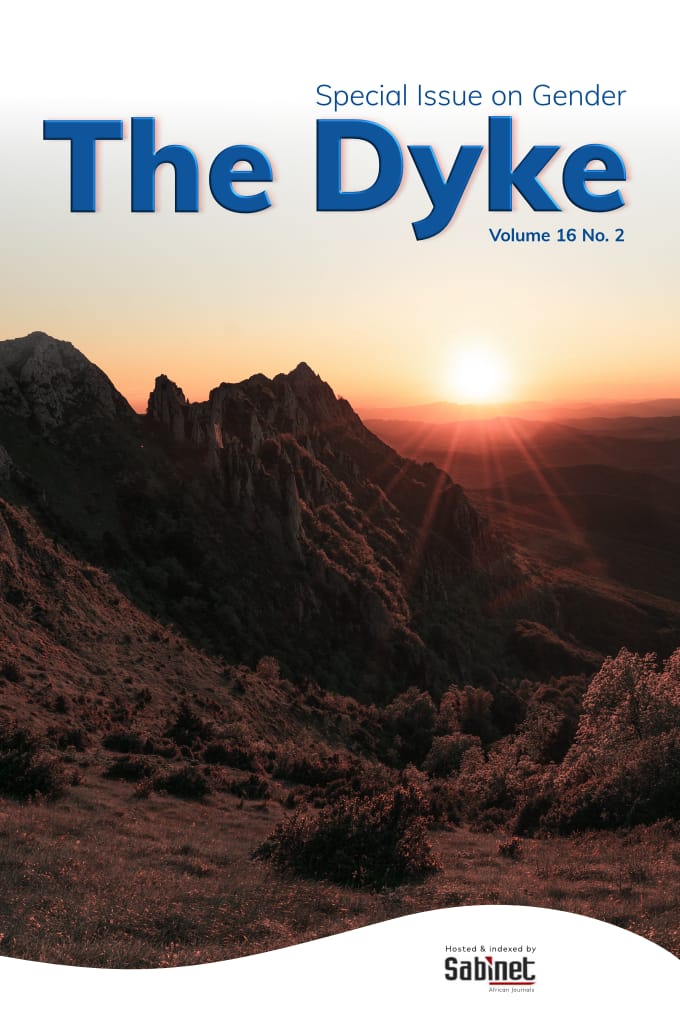Are men victims of Gender Based Violence (GBV)? Why the deafening silence among men in institutions of higher learning?
DOI:
https://doi.org/10.64754/thedyke.v16i2.182Keywords:
Men, Literacy, Gender-based violence, Abuse, Zimbabwe, Higher learning institutionsAbstract
Gender-based violence (GBV) is a very serious pandemic that has been prevalent in society for a very long time. Its impact has been felt, and exacerbated by the Covid 19 pandemic globally, especially in sub-Saharan Africa. Most studies have shown that women are the majority of victims of GBV. However, very little has been said about men as victims. This study helps explain why a highly literate country like Zimbabwe, has very high GBV rates. This study interrogates why men aged between 18 years and 25 years old, and attending institutions of higher learning in Harare remain mum in the face of GBV. The study adopted a qualitative research design and data was collected using focus group discussions, and semi-structured interviews. To do so effectively, 12 women and 12 men were interviewed in focus groups separately, the former, to explain why they remain silent when abused and the latter to help understand why they abuse men. The findings showed that men remained silent because of cultural norms and prejudices pertaining to masculinity, that men cannot be victims of GBV. Men also remained silent due lack of knowledge on where/how to get help as victims and the fear of emotional instability that would come once they disclose they were victims of GBV. Recommendations include having campaigns that educate that men can be victims of GBV and have more resources that help all victims of GBV.
References
Bronfenbrenner, U. 1979. The ecology of human development: Experiments by nature and design. Massachusetts: Harvard University Press.
Bronfenbrenner, U. 1992. Ecological systems theory. London: Jessica Kingsley Publishers.
Culatta, E., Clay-Warner, J., Boyle, K., and Oshri, A. 2020. Sexuality revictimization: A routine activity theory explanation. Journal of Interpersonal Violence, 35(15-16), 2800-282.
Criminal Law (Codification and Reform) Act [Chapter 9:23]. Act 23/2004 Davids, N. 2020. Gender-based violence in South African universities: An institutional challenge. Council on Higher Education, 10, 1-13.
Dlamini, N. J. 2021. Gender-based violence, twin pandemic to COVID-19. Critical Sociology, 47(4-5), 583-590.
De Vos, A.S., Strydom, H., Fouche C, B. and Delport, C, S, L. 2005. Research at grass roots: For the social sciences and human services professions (3rd edition). `Pretoria: Van Schaik Publishers.
Falkof, N., Phadke, S. and Roy, S., 2022. Intimacy and injury: In the wake of #MeToo in India and South Africa. Intimacy and injury, pp.1-376.
Gwarisi, M. (2020, August 30). Women cannot rape men according to Zimbabwean Law. Health Times. Retrieved from: https://healthtimes.co.zw/2020/10/30/women-cant-rape-men-according-to-zimbabwean-law/.
Government of the United Kingdom. (2021, July 21). Position statement on male victims of crimes considered in the cross-government strategy on ending Violence against Women and Girls (VAWG). https://www.gov.uk/government/publications/strategy-to-endviolence-against-women-and-girls.
Health Times, 2019. GBV cases against men are on the rise. Retrieved from https://healthtimes.co.zw/2019/04/08/gbv-cases-against-men-on-the-rise/.
Mawere, D. and Seroto, J. 2022. Academic contrapower sexual harassment in public universities in Zimbabwe. South African Journal of Higher Education, 36(1), 193-206. https://dx.doi.org/10.20853/36-1-4515.
Makhene, A. 2022. Gender-based violence in higher education: An integrative review. Open Journal of Social Sciences, 10(3), 234-247.
Ndlovu, C. (2021, December 6). Women brutalise men at gender-based violence hotspot. The Chronicle. Retrieved from: https://www.chronicle.co.zw/women-brutalise-men-at-gender-based-violence-hotspot/.
Rupapa, T. (2022, October 28). First Lady bemoans GBV, sexual abuse in tertiary institutions. The Herald. Retrieved from: https://www.sexrightsafrica.ent/zimbabwestudents-fighting-gv-campus/.
Siebritz, G. (2022, August 24). Gender-based violence on university campuses raises concerns. Careers Portal. Available: https://www.careersportal.co.za/ news/gender-based-violence-on-university-campuses-raises-concerns.
Shared Africa Value Initiative. 2022. African universities take a stand against GBV. Retrieved from: https://svai.africa/news/african-universities-take-a-stand-against-genderbased-violence-not-only-in-saying-but-also-in-doing/.
UNESCO Institute for Statistics. 2022. Zimbabwe education and Literacy. Retrieved from: http://uis.unesco.org/en/country/zw.
UNFPA. 2016. Zimbabwe national gender-based violence strategy. https://www.veritaszim.net/sites/veritas_d/files/Zimbabwe%20National%20Gender%20Based%20Violence%20Strategy%202012%20-%202015.pdf.
UNHCR. 2022. Gender-based Violence. Retrieved from:https://www.unhcr.org/gender-based-violence.html. Retrieved 20 September 2022.
Wafula, J. A. 2018. Addressing GBV in educational institutions: The Countiesâ Involvement. IJASSH.
Zimbabwe Cluster Status: Protection (Gender-based Violence. 19 February 2021. Retrieved https://reports.unocha.org/en/country/zimbabwe/card/2XxB9GOV93/. Retrieved 20 September 2022

Downloads
Published
How to Cite
Issue
Section
License
All articles in The Dyke are published under the Creative Commons Attribution 4.0 International License (CC BY 4.0).
Under this licence:
- Others may copy, redistribute, remix, transform, and build upon the work for any purpose, even commercially.
- Appropriate credit must be given to the original author(s) and source (The Dyke), along with a link to the license.
- Any changes made must be indicated.
Full licence details: https://creativecommons.org/licenses/by/4.0/
Archiving and Preservation
The Dyke supports long-term preservation of scholarly work through partnerships with digital repositories and indexing services, including Sabinet African Journals. Authors are also encouraged to deposit a copy of their published article in institutional or subject-specific repositories.




